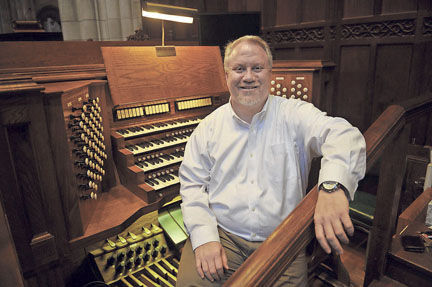By Philip Sean Curran
On Sunday mornings, Eric Plutz makes music that fills the Princeton University Chapel with the sound of an organ that is as old as the house of worship that opened in 1928.
Since 2005, Mr. Plutz has been the principal university organist. In that capacity, he plays Sunday services at 11 a.m., weddings, funerals and other services and concerts through the year.
”This is my dream job,” said Mr. Plutz, 48, during a recent interview from a room inside the chapel.
For nearly 30 minutes, the native Midwesterner explained how he came to play the organ, the journey that brought him to the Princeton community as a college student more than 30 years ago and what feelings he wants people to have after they hear him perform.
Music has been part of Mr. Plutz’s life from his youth growing up in Rock Island, Illinois. His father and mother were amateur musicians who sang in the choir at the South Park Presbyterian Church. When he was 8, he started playing the piano with his mother, Harriet, teaching him how to read music, and the very beginnings of the instrument.
”My parents understood that they should try to get their children to play musical instruments,” said Mr. Plutz, the middle child and the only son. “Mom could tell that I had some talent there, that I seemed to be taking to it pretty quickly.”
He traces his journey to playing the organ to when, four years later, he visited an uncle who lived outside of Indianapolis and went to the Paramount Music Palace in the city. Though movies no longer screened there, two main organists would play the theater organ for 30-minute shows.
”But what was fascinating to a 12-year-old boy was that… everything that happened, there such a visual element to it. When he’d play the marimba, the light would shine on the marimba,” Mr. Plutz said of watching the organists. “So I wanted to do that. I wanted to do all that stuff. I wanted to make all that stuff happen. I was hooked.”
He told his mother that he was interested in playing the organ. She suggested he meet with their church’s music director, who taught him what she knew.
Through high school, he took organ and piano lessons, participated in the band and served as president of the band his senior year. When it came time to decide where to continue his education, he went to Rider University’s Westminster Choir College, located in Princeton.
He also had been considering Oberlin Conservatory, where he also was accepted, but the Ohio-based school gave no financial aid and Westminster did. From the family perspective, the decision was easy.
”And my mom said, ‘You’re going to Westminster,’ “ he said.
If he were a big fish in small pond back home in Illinois, that was no longer the case when he arrived on campus in 1985.
”But it wasn’t until I came to Westminster Choir College here, where all of sudden I was surrounded by people who were just as much into music as I was and often just as talented,” he said.
Graduating in 1989, he later receive a master’s of music from the Eastman School of Music. He would serve as the organist and director of music at the Church of the Epiphany in Washington D.C. from 1995 to 2004.
During a sabbatical from that job, he had heard that then-Princeton University organist, David Messineo, had died in the summer of 2004. Mr. Plutz applied for the opening thinking the time was right to make the move to Princeton.
”I just saw that this was a possibility and I said, ‘I’m going to go for that,’” he said.
He auditioned for the job for an organist-only position that did not include other duties. He was named to the post in 2005.
The university chapel is a large place, a Gothic-style cathedral that is home to a Mander-Skinner organ that has nearly 7,900 pipes. Mr. Plutz had first heard it in person as a college freshman.
”Some people might understand what a harpsichord is compared to a piano. It’s more of the concert grand piano than the harpsichord,” he said. “It’s an instrument that is… built to play romantic music so that’s how I would describe it, that it’s an orchestral instrument, it’s meant to imitate an orchestra.”
Today, it is the kind of instrument that Mr. Plutz said he wants to play every Sunday.
”Every time I walk into this building, I am grateful that this is my job,” he said. “I am the luckiest person, to be able to play this instrument — an instrument that speaks to me, that I really love.”
As an organist at a university, Mr. Plutz said his audience can run the gamut from the student worried about his thesis to an older person in the twilight of life. It can be an eclectic mix.
”Every person coming in here is in a different place in their mind, in their life,” he said. “And I can only hope that whatever I play, whatever they take away from both from the organ or from the building will calm them or inspire them or make them feel connected to the world.”

